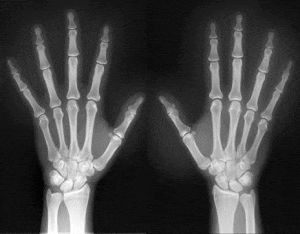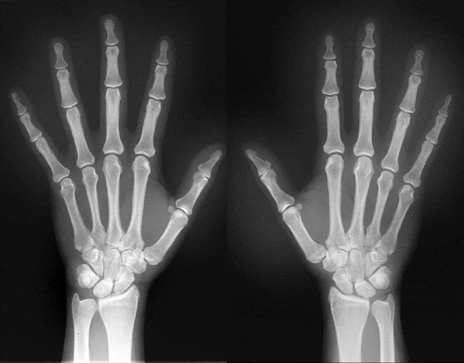
This image shows mild RA with no damage to finger joints 8 years after initial diagnosis. (Photo courtesy of University College Dublin)
The discovery of the protein regulating the severity of tissue damage caused by rheumatoid arthritis (RA) could possibly help fast-track RA patients to more aggressive treatments, a new study suggests.
More specifically, the discovery of this protein—called C5orf30—may help identify RA patients most likely to experience the most severe effects from the condition, and could fast-track them to the more aggressive treatments available, according to a news release from University College Dublin.
The release explains that to carry out the study—published recently in PNAS—an international team of scientists from University College Dublin and the University of Sheffield analyzed DNA samples and biopsy samples from the joints of more than 1,000 RA patients in the United Kingdom and Ireland.
“Our findings provide a genetic marker that could be used to identify those RA patients who require more aggressive treatments or personalized medicine,” says Professor Gerry Wilson from the UCD School of Medicine and Medical Science, University College Dublin, who led the research, in the release.
“They also point to the possibility that increasing the levels of C5orf30 in the joints might be a novel method of reducing tissue damage caused by RA,” he adds.
RA, which the release states affects around 1% of the population, has no cure, but new drugs to treat the disease and prevent deformation of joints are becoming increasingly available. Self-management of the condition by patients can help reduce pain and the resulting disability, the release continues.
Central to managing the condition is determining the most appropriate treatment as early as possible. With early diagnosis and aggressive treatment, it is possible to reduce the joint damage caused by RA, per the release.
One of the biggest difficulties with treating the condition is early diagnosis. With early diagnosis and aggressive treatment, it is possible to reduce the damage to the joints caused by RA. Deciding the most appropriate treatment for each patient at the earliest possible stage is central to effectively tackling the condition, the release explains.
[Source(s): University College Dublin, EurekAlert]





